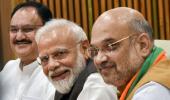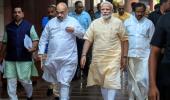Shifting positions on religiosity and Covid may confuse the Hindutva citizenry, but you can rely on Bengal to turn a non-arguable issue into a raging controversy, notes Kanika Datta.

Prime Minister Narendra Modi has addressed the nation so many times this year that it was easy to ignore the seventh one on October 20.
After his lockdown shocker on March 24, the entertainment value of his messaging had diminished.
As the virus spread through India at warp speed, perhaps even he realised that exhorting his countrymen to bang thalis or turn off the lights and burn diyas had limited traction when people are struggling with salary cuts and job losses.
But his latest speech -- the third shortest of his televised addresses to the nation in 2020 -- was probably his most significant in the context of the increasing intensity of his party's ideological platform.
In it, he cautioned friends, Indians and countrymen to stay cautious during the festive season.
'The lockdown may have ended but the virus is still there,' he said and reminded everyone to observe the mask-and-social-distancing protocol that remains our principal defence against Covid.
It was a sobering message ahead of the upsurge of festive fervour.
Coming from Mr Modi, it is also unexpected.
True, he and his Cabinet have been conscientious about observing safety norms in public.
But given the communally charged opprobrium that accompanied the discovery of the Tablighi congregation in Delhi, you would have thought the most fervid exponents of Hindutva would have been conspicuously circumspect about religious gatherings.
This seemed to be the case when three Bharatiya Janata Party-ruled states of Uttar Pradesh, Uttarakhand and Haryana displayed a model sense of responsibility by jointly agreeing in June to suspend the annual kanwariya yatra, which entails closing down whole highways for weeks and large crowds of devotees at railway stations and temples.
But Mr Modi's performance (duly masked) of the bhoomi puja at Ayodhya appeared to contradict the implicit restraint displayed by his party's chief ministers and sent out a clear message that when it came to politics, religion trumped health and safety.
Outside the venue large celebratory crowds gathered, requiring an appeal from Yogi Adityanath, no slouch himself in disobeying lockdown rules, to disperse.
Indeed, this potential super-spreader event in August was preceded in July by an extraordinary four-day reversal by the Supreme Court, first disallowing and then allowing the Puri Yatra to take place.
For this about-turn, the apex court, acutely tuned to political signals, earned plaudits from Amit Shah, who was to find himself severely infected with the virus just weeks later.
Unsurprisingly, nobody followed the feeble safety strictures that the Supreme Court had ordered for the Puri and yatras held elsewhere in the country that took the ruling as a carte blanche.
Unsurprisingly, it was from July that Covid cases started soaring alarmingly.
So alarmingly that in August, the Supreme Court reversed its position yet again by ruling that Ganesh Chaturthi involved large congregations and could not be allowed.
Meanwhile, the Centre has reverted to responsible mode.
When the governor of Maharashtra, one of India's worst Covid hit states, sneered at Chief Minister Uddhav Thackeray's 'secularism' for keeping temples in the state closed, he was rapped on the knuckles by no less than the Union home minister.
These shifting positions on religiosity and Covid may confuse the Hindutva citizenry, but you can rely on Bengal to turn a non-arguable issue into a raging controversy.
Since the state is headed by a chief minister who has made a spurious secularism the lynchpin of her power, the question of allowing pandals has become Ground Zero for political rivalry.
Had the Left Front been in power, it is likely that pandals would not have been allowed -- just as it enforced the no-noise rule during Diwali.
Mamata Banerjee, whose ham-handed Muslim appeasement inadvertently opened the doors for the BJP, has come down decisively against the cause of health and safety.
Declaring that people needed relief from these grim times, she committed her cash-strapped government to give Rs 50,000 to each Durga Puja committee in Bengal.
The signal for a free-for-all 10 days flashed brightly, horrifying many a bhadralok, until the Calcutta high court put a damper by limiting the number of people allowed in pandals, a number it expanded slightly after a review petition.
Being the astute politician, Mr Modi has made his Bengal play a studied contrast to Ms Banerjee's irresponsible generosity.
His greatest pandemic policy test -- on the future of the Kumbh Mela in January -- is yet to come.
But on he marked the BJP's bid to make Bengal Trinamool Congress-mukt by inaugurating a pandal in Kolkata and delivering a model campaign speech ahead of the May 2021 assembly elections -- all virtually.
How this image of responsible religiosity must have rankled!
Feature Presentation: Ashish Narsale/Rediff.com











